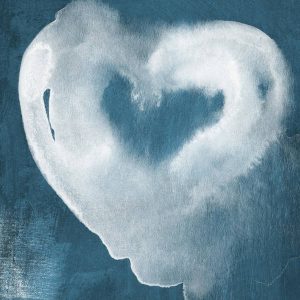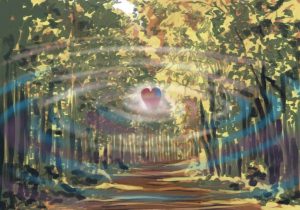 The Yogabliss, Your Heart Life on-line Moving into Meditation classes met this morning. We cultivated Self compassion. In the safe space of loving kindness it may be possible to relax harsh judgments and fixed views. There is much to be discovered in that space. Creating breathing room around our pain and suffering can help to recognize what is truly needed.
The Yogabliss, Your Heart Life on-line Moving into Meditation classes met this morning. We cultivated Self compassion. In the safe space of loving kindness it may be possible to relax harsh judgments and fixed views. There is much to be discovered in that space. Creating breathing room around our pain and suffering can help to recognize what is truly needed.
We drew on Dr. Kristen Neff’s work which establishes the healing benefits of self-compassion practice. You can find guided practices and compassion exercises at her web-site.
We heard Julia Fehrenbacher’s poem The Most Important Thing. Julia is a poet, teacher, coach and sometimes painter.
We heard Zen Master and teacher Thich Nhat Hanh’s teachings. He dedicated much of his life to the practice and teaching of compassion and loving kindness. You can find resources for the practice of mindfulness and articles and videos at the Thich Nhat Hanh Foundation web-site.
I invite you give yourself time. What is it like to stop doing? Can you set aside planning and remembering? What is being like? You might be swimming in different awarenesses. I invite you to take a moment or two to explore your body.
You can scan from head to toe or from the out layers of skin to your internal organs. Sensations may be calling your attention. What is it like to be aware of your body?
Take a moment to experience the energy of being. Are you feeling balanced and aware? Energetic or alert? Calm, steady, grounded? How does breathing feel right now?
You might notice the presence of emotions. How are they affecting your body and breath?
 What is the state of your mind? Are thoughts elaborating? Are they familiar or new?
What is the state of your mind? Are thoughts elaborating? Are they familiar or new?
Is it possible for you to tune in to that part of you that is engaging meta consciousness? This is your ability to be aware of your body, energy, thoughts and emotions. (You might experience this as discernment, witnessing or intuiting.) If you are meeting stillness that’s o.k.
I invite you to reflect on spiritual being – whatever that might mean for you.
What is it like to be present for these dimensions of being?
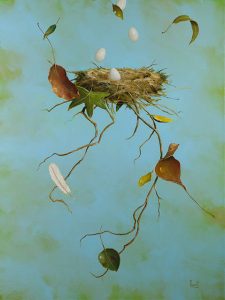 This may be a difficult time in your life. You may recall difficult moments in the past. You might be worried about something in the future. In moments when you are feeling discomfort in your body, sadness in your heart or trouble in your mind, can you pause? Can you be with this experience?
This may be a difficult time in your life. You may recall difficult moments in the past. You might be worried about something in the future. In moments when you are feeling discomfort in your body, sadness in your heart or trouble in your mind, can you pause? Can you be with this experience?
In this pause, can you recognize that part of you that is aware and able to discern all these expressions of being?
This includes our inter-being – our inter-relationship with all of life.
I invite you to take a moment to reflect on your relations – family, friends, those of us in circle and people you don’t know. Can you recognize that other people share your experience? You are not alone. You are an important part of the world – a world of many who feel joy and sorrow, pain and loss. You might connect with the heart felt desire that all beings grow in love and peace.
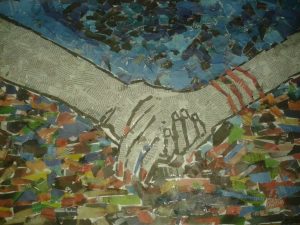 Can you take this time to offer kindness to yourself? You might place your hands over your heart as a gesture of compassion. As you breathe in, imagine the breath is softening the area around your heart or an other area in need of soothing. You might repeat silently to yourself, “It’s OK.” As you breathe out, take your time and imagine letting go of any tension around the heart and repeat, “This is enough,” It’s O.K. It’s enough. Can your inner voice be patient, soothing and loving? Repeat this for a few slow breaths and stop when you feel ready.
Can you take this time to offer kindness to yourself? You might place your hands over your heart as a gesture of compassion. As you breathe in, imagine the breath is softening the area around your heart or an other area in need of soothing. You might repeat silently to yourself, “It’s OK.” As you breathe out, take your time and imagine letting go of any tension around the heart and repeat, “This is enough,” It’s O.K. It’s enough. Can your inner voice be patient, soothing and loving? Repeat this for a few slow breaths and stop when you feel ready.
Reflect on how you are feeling in your body, heart and mind. What is needed in this moment?
Poet Julia Fehrenbacher writes of The Most Important Thing
I am making a home inside myself. A shelter
of kindness where everything
is forgiven, everything allowed—a quiet patch
of sunlight to stretch out without hurry,
where all that has been banished
and buried is welcomed, spoken, listened to—released.
A fiercely friendly place I can claim as my very own.
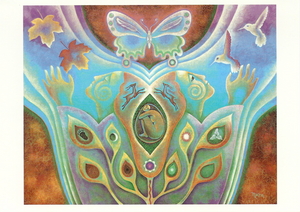 I am throwing arms open
I am throwing arms open
to the whole of myself—especially the fearful,
fault-finding, falling apart, unfinished parts, knowing
every seed and weed, every drop
of rain, has made the soil richer.
I will light a candle, pour a hot cup of tea, gather
around the warmth of my own blazing fire. I will howl
if I want to, knowing this flame can burn through
any perceived problem, any prescribed perfectionism,
any lying limitation, every heavy thing.
I am making a home inside myself
where grace blooms in grand and glorious
abundance, a shelter of kindness that grows
all the truest things.
I whisper hallelujah to the friendly
sky. Watch now as I burst into blossom.
Can we build that inner shelter – where everything is forgiven? Where all that has been banished is welcomed, spoken, listened to and released?
I invite you to relax whatever you can and feel Earth supporting you. May you feel at home in this quiet place of practice where you can stretch out without hurry. As poet Dane Anthony writes: “ It is alright to be exactly what you are, who you are, where you are. Right here, right now.”
Zen Master Thich Nhat Hanh writes:
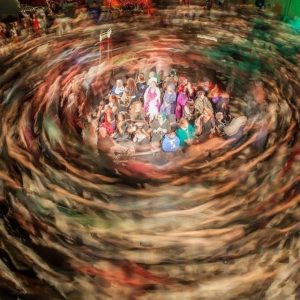 When we can shed the light of compassionate attention on our actions, an interesting shift can happen – this . . . becomes a seed of compassion for all the other people just like us who are caught in fixed mind, closed mind, hard heart. We let this recognition connect us with others.
When we can shed the light of compassionate attention on our actions, an interesting shift can happen – this . . . becomes a seed of compassion for all the other people just like us who are caught in fixed mind, closed mind, hard heart. We let this recognition connect us with others.
How do these words land in your heart? Can you remember a time when you offered yourself compassionate attention? If you can’t remember, can you imagine what it would be like?
Researcher and teacher, Dr. Kristin Neff, encourages us to practice self compassion in three fundamental ways: self kindness, our common humanity and mindfulness.
We are encouraged to offer self-kindness and to suspend self-judgment. She describes as being:
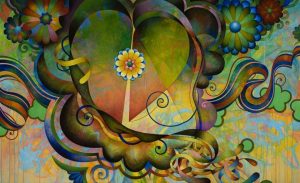 . . . warm and understanding toward ourselves when we suffer, fail, or feel inadequate . . . we don’t ignore our pain or criticize ourselves . . . This recognition [may] lead you to acceptance, equanimity . . . .
. . . warm and understanding toward ourselves when we suffer, fail, or feel inadequate . . . we don’t ignore our pain or criticize ourselves . . . This recognition [may] lead you to acceptance, equanimity . . . .
When we feel alone in our difficulties we are encouraged to recognize our common humanity:
 Our disappointments, our frustration at not having things . . . as we want often lead to a pervasive sense of isolation . . Being “human” means that one is mortal, vulnerable and imperfect. We realize self-compassion when we can recognize that suffering . . . is part of our shared human experience – something that we all go through rather than being something that happens to “me” alone.
Our disappointments, our frustration at not having things . . . as we want often lead to a pervasive sense of isolation . . Being “human” means that one is mortal, vulnerable and imperfect. We realize self-compassion when we can recognize that suffering . . . is part of our shared human experience – something that we all go through rather than being something that happens to “me” alone.
We offer ourselves self-compassion by cultivating mindfulness:
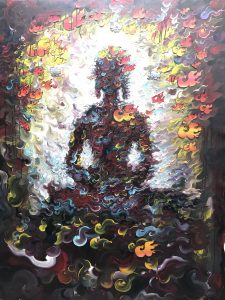 When we experience adversity, disappointments, losses . . . we can quickly find ourselves suppressing or exaggerating our difficult emotions. They can seem . . . overwhelming. . . We may regain our balance . . . by placing our own situation into a larger perspective. We . . . observe our . . . thoughts and emotions with openness and clarity . . . we hold them in mindful awareness . . . Mindfulness is a non-judgmental, receptive mind state . . . a spacious state of mind in which we can observe our thoughts and feelings as they are, without trying to suppress or deny them. Right now you . . . might cultivate this open spacious mind and observe what ever arises . . .
When we experience adversity, disappointments, losses . . . we can quickly find ourselves suppressing or exaggerating our difficult emotions. They can seem . . . overwhelming. . . We may regain our balance . . . by placing our own situation into a larger perspective. We . . . observe our . . . thoughts and emotions with openness and clarity . . . we hold them in mindful awareness . . . Mindfulness is a non-judgmental, receptive mind state . . . a spacious state of mind in which we can observe our thoughts and feelings as they are, without trying to suppress or deny them. Right now you . . . might cultivate this open spacious mind and observe what ever arises . . .
May we be kind to ourselves . . . May our feelings affirm and deepen our shared humanity . . . May we open to our true being in the clear spaciousness of kind awareness .

